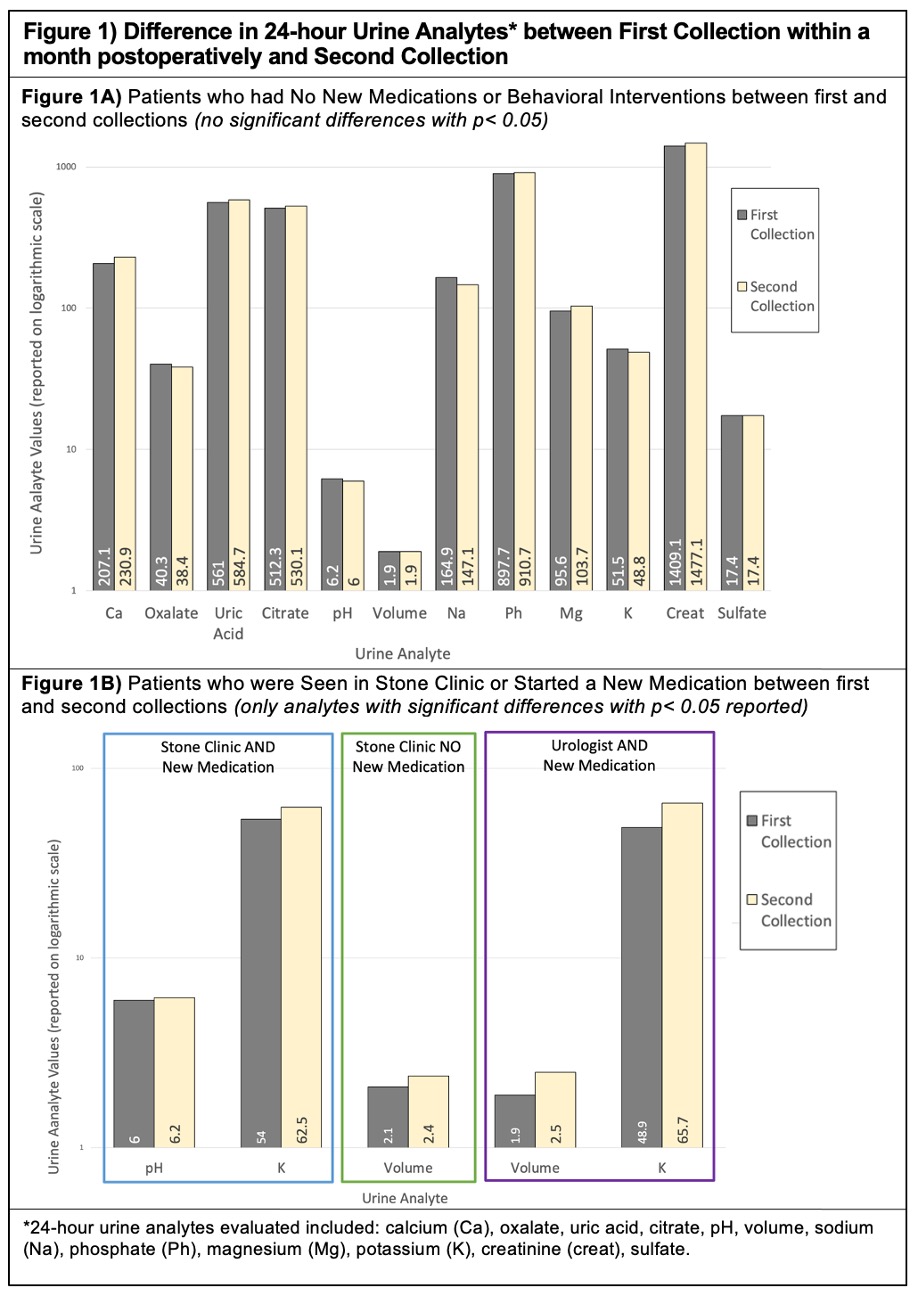Back
Poster, Podium & Video Sessions
Moderated Poster
MP26: Stone Disease: Epidemiology & Evaluation I
MP26-04: 24-Hour Urine Collections Performed in the Immediate Post-Operative Period are Accurate for Metabolic Stone Evaluation
Saturday, May 14, 2022
10:30 AM – 11:45 AM
Location: Room 225
Emily Serrell*, Margaret Knoedler, Shuang Li, Sean Hedican, Sara Best, Kristina Penniston, Stephen Nakada, MADISON, WI

Emily C. Serrell, MD (she/her/hers)
University of Wisconsin
Poster Presenter(s)
Introduction: Many experts advocate collecting an initial 24-hour (24h) urine study at least one month after stone surgery. We believe performing 24h urines earlier improves compliance without compromising results. We hypothesize that in the absence of medical or metabolic intervention, 24h urine studies collected within a month of stone treatment will not differ significantly from those collected later.
Methods: An IRB approved retrospective database of adult patients who underwent surgical treatment for urolithiasis (1/1/2009-8/31/2021) was analyzed. Information was collected for those with a first 24h urine study within a month of surgery and a second within 24 months of the first. Patients were divided into four groups based on treatment between collections: no new treatment; seen in metabolic stone clinic without new medication; seen in metabolic stone clinic with new medication; not seen in metabolic stone clinic but with new medication prescribed by a urologist. Direct differences between two urine studies were compared by multivariate analysis. 24h urine analytes included: calcium, oxalate, uric acid, citrate, pH, volume, sodium, phosphate, magnesium, potassium, creatinine, and sulfate.
Results: Of 172 patients with 24h urine studies within a month of surgery, a second study was collected an average of 8.4±4 months later. In 26 patients with no new treatment between first and second study, there were no significant differences in urine analytes (Figure 1A). The 46 patients seen at metabolic stone clinic with new medication had increased urine pH (6±0.7 vs 6.2 ±0.7, p=0.01) and potassium (54±24.4 vs 62.5±28.4, p=0.02). The 89 patients seen at metabolic stone clinic with no new medication had increased volume (2.1±0.8 vs 2.4±0.9, 0.004). The 12 patients with new medication prescribed by urologist had increased potassium (48.9±17.4 vs 65.7±16.8, 0.016) and volume (1.9±0.6 vs 2.5± 0.9, p=0.014; Figure 1B)
Conclusions: Twenty-four hour urine studies performed within a month of stone surgery did not differ significantly from studies collected later. Our report suggests that collections performed in the immediate post-operative period are valid, which should improve compliance in metabolic evaluation.
Source of Funding: na

Methods: An IRB approved retrospective database of adult patients who underwent surgical treatment for urolithiasis (1/1/2009-8/31/2021) was analyzed. Information was collected for those with a first 24h urine study within a month of surgery and a second within 24 months of the first. Patients were divided into four groups based on treatment between collections: no new treatment; seen in metabolic stone clinic without new medication; seen in metabolic stone clinic with new medication; not seen in metabolic stone clinic but with new medication prescribed by a urologist. Direct differences between two urine studies were compared by multivariate analysis. 24h urine analytes included: calcium, oxalate, uric acid, citrate, pH, volume, sodium, phosphate, magnesium, potassium, creatinine, and sulfate.
Results: Of 172 patients with 24h urine studies within a month of surgery, a second study was collected an average of 8.4±4 months later. In 26 patients with no new treatment between first and second study, there were no significant differences in urine analytes (Figure 1A). The 46 patients seen at metabolic stone clinic with new medication had increased urine pH (6±0.7 vs 6.2 ±0.7, p=0.01) and potassium (54±24.4 vs 62.5±28.4, p=0.02). The 89 patients seen at metabolic stone clinic with no new medication had increased volume (2.1±0.8 vs 2.4±0.9, 0.004). The 12 patients with new medication prescribed by urologist had increased potassium (48.9±17.4 vs 65.7±16.8, 0.016) and volume (1.9±0.6 vs 2.5± 0.9, p=0.014; Figure 1B)
Conclusions: Twenty-four hour urine studies performed within a month of stone surgery did not differ significantly from studies collected later. Our report suggests that collections performed in the immediate post-operative period are valid, which should improve compliance in metabolic evaluation.
Source of Funding: na


.jpg)
.jpg)